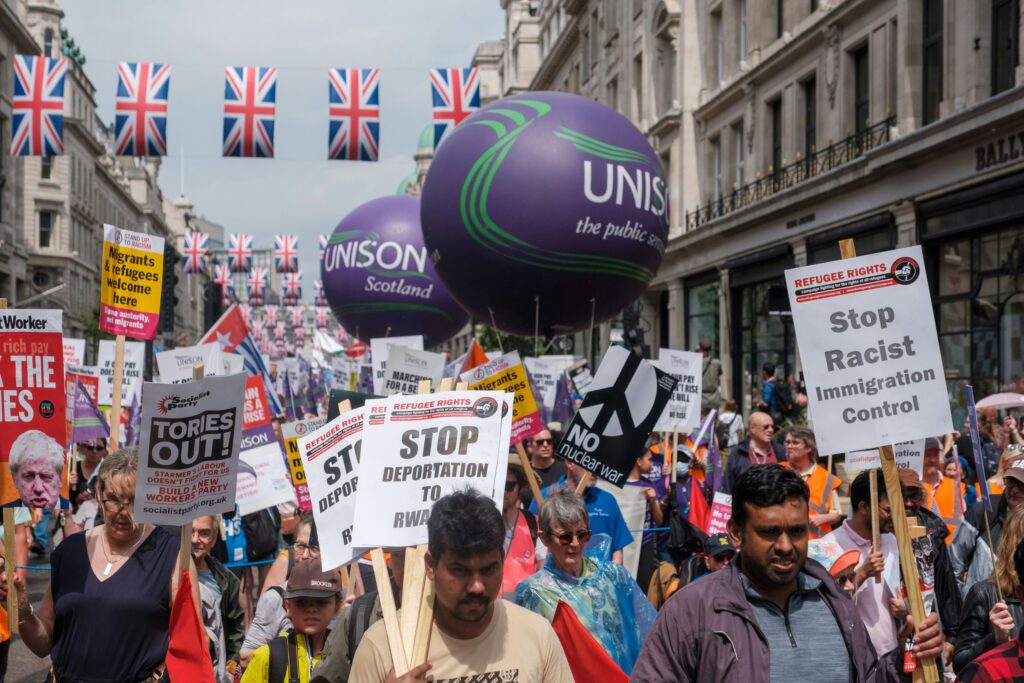The labour exploitation of migrant care workers isn’t simply due to ‘rogue employers’, it’s etched into the fabric of the UK’s Immigration system.
Written by Kezia Pugh
Last week, the UK Government announced plans to end international recruitment of care workers, alongside tightening of Skilled Worker visas and doubling the wait for settlement in the UK. Although unsurprising given the Labour Party’s current rhetoric and approach to immigration policy, this decision will have devastating consequences for migrant care workers and the people they care for. Having been criticised by both the Conservatives and Reform for not going far enough, these announcements also do little to placate the rise of far-right politics and structural racism in the UK.
Between 2022 and 2024, an estimated 185,000 care workers came to the UK on the Health and Care Worker visa. These workers provide vital care to those in need, in a sector facing dire workforce shortages after decades of expanding marketisation and privatisation.
In March 2024, it was announced that care workers were no longer allowed to bring dependants (partners and/or children) to the UK with them.
Following these changes, the number of Health and Care Worker visas granted fell by 26 per cent, with visa applications falling by a staggering 81 per cent. This continuation of the hostile environment is no accident; it indicates that exploitation is part and parcel of the UK’s migration system.

Widespread Exploitation in the Shadows of the UK Care Sector
Reports of widespread labour exploitation among migrant care workers have sharply increased in the past few years. Many care workers are forced to work excessively long hours and are subjected to wage theft and underpayment of minimum wage, alongside racialised harassment and abuse.
This is on top of exorbitant visa and recruitment fees, often trapping workers in debt bondage to an employer or agency. Neither the Health and Care Worker visa (used most commonly in the formal social care sector) nor the Overseas Domestic Worker visa (sometimes used in informal domestic care settings) offers recourse to public funds, and both require workers to be sponsored by, and therefore tied to, their employer. This strictly limits access to work elsewhere, and, if employment is terminated, workers have 60 days to find a new job to sponsor them.
Many care workers are forced to work excessively long hours and are subjected to wage theft and underpayment of minimum wage, alongside racialised harassment and abuse.
This may not come as a surprise to readers of Migrant Women Press, which earlier this year highlighted a report by Women of Zimbabwe and Action for Southern Africa, uncovering failures and discrimination by the Home Office against single-mother migrants working in health and social care. This report is one of many published recently that have sounded the alarm on the dangers associated with employer visa sponsorship. This includes exposés from frontline community organisations like Work Rights Centre, Citizens Advice, UNISON, Unseen, and The Bureau for Investigative Journalism. What unites these accounts is recognition of the systemic drivers of labour exploitation among migrant care workers.
Despite calls from campaign organisations and trade unions recommending radical restructuring of the visa system, the Government has refused to consider this a systemic issue. In an attempt to crack down on exploitative labour practices, last year the Home Office introduced measures banning ‘rogue employers’ in social care from hiring migrant workers by revoking their licences. In practice, this has left many workers in deeply precarious situations at risk of losing their jobs or status in the UK. Addressing this problem on an individualised basis is to fundamentally ignore the ways exploitation is structurally embedded into the organisation of the labour market for migrant workers.

Gendered and Racialised Dimensions of Migrant Labour Exploitation
By design, migrant workers in low-paid, precarious, and fragmented sectors like care are poorly accommodated within the UK’s migration system. The governance of migrant labour through sector-tied visas has been adopted by many countries in the Global North, directly preventing workers from freely moving within the labour market. This restrictive policy acts as a ‘paper chain’ binding workers to either a singular sector or employer, and, according to Dr Mayaan Niezna, is tantamount to a ‘legal means of coercion’. Given that care is a highly feminised sector, these hostile migration policies have gendered implications. In a recent academic study, Dr Natalie Sedacca highlighted that around 85 per cent of applications to lift the ‘no recourse to public funds’ visa condition are women, reflecting how migrant women often have caring responsibilities outside of their paid work.
As a result, many migrant women are restricted to insecure or, at times, informal work arrangements, which can often lead to further exploitation. The criminalising of work for undocumented migrants is also an acutely harmful policy perpetuated by the UK’s migration system, which, given the close relationship between labour market enforcement and immigration enforcement, deters the reporting of abusive and exploitative practices. This drives work into hidden or unregulated spaces, which also increases exposure to sexual harassment and abuse.
Given that care is a highly feminised sector, these hostile migration policies have gendered implications.
This uncovers a fundamental injustice etched into the fabric of the UK’s migration system, constructed by the social and legal categories of citizens and migrants. Deep-seated racialised hierarchies and inequalities have led the term ‘migration’ to signify ‘problematic mobility’, as proposed by Professor Bridget Anderson. This has led academics to centre analysis of migration on the nation-state’s system of bordering and boundary-making, through which people are targeted and problematised as migrants.
This is where the UK’s migration system is reminiscent of colonial othering, a process which contributes to the ‘lump of labour fallacy’. The approach claims that a national economy has a fixed amount of work available, and that more jobs for migrants equate to fewer jobs for citizens. Although categorically false, this narrative has become deeply entrenched in political infrastructure and is parroted by those from across the political spectrum. Restrictive migration policies are therefore a prime example of how the state actively creates the conditions for exponential growth in racialised xenophobia and racism.
As we await further details of how and when new migration restrictions will come into effect, grassroots community and labour organising will play a key role in responding to, reporting on, and resisting the impact of these incoming policies.
If you or someone you know is involved in a community group, campaign, or organisation working in this area, please consider taking part in a short interview about your work. Get in touch with k.pugh4@uni.brighton.ac.uk for more information.

Kezia Pugh is a PhD candidate in Sociology, researching the intersections between care, migration, and labour exploitation. She is particularly interested in exploring grassroots community-led responses and resistance to the labour exploitation of migrant care workers.



